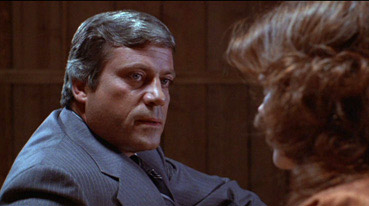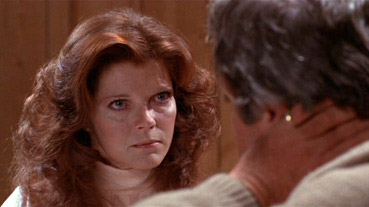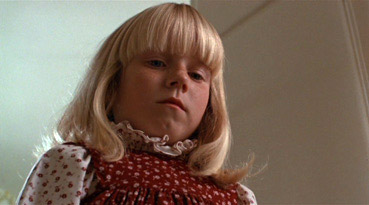| |
'The mother is ultimately destroyed in the process. "I can't tell you how satisfying that scene is," said Cronenberg. "I wanted to strangle my ex-wife."' |
| |
David
Cronenberg in Cinefantastique, Vol. 10 No. 4 |
David
Cronenberg is now established as one of the most individualistic,
imaginative and accomplished directors in modern cinema,
but in his early days as a quirky genre director he was
not so widely celebrated. There were plenty of us championing him as a potential Horror God after Shivers
and Rabid,
but there were even more who were outraged by his low-budget
body horror works, many of them angrily dismissive of his talent.
On the release of his third genre feature, The Brood,
the then voice of the TV film criticism, Barry Norman, admitted
that this Cronenberg fellow appeared to have a cult
following, but that as far as he was concerned it must be a cult
of demented sickos. Or words to that effect – it was a long
time ago and I don't have a transcript of the programme.
But I remember that put-down nonetheless, especially as I was
a fully paid-up member of that very same cult. For me, The
Brood was not just another fine work from an increasingly
impressive new genre director, but marked something of a watershed in his filmography
– after two films featuring serviceable lead players (or in the case of Rabid, one serviceable and one unexpectedly good), Cronenberg had two experienced and supremely talented performers
at his disposal, both of whom are on impressive form. And
there was something else going on, something beneath
the surface beyond the director's usual concerns of disease and bodily corruption. It was to be a while before I realised that
there was a deeply autobiographical element running through
the film. But more of that later.
Nothing
about The Brood can be considered straightforward, and that includes
the plot. Get your head around this. At the institute of
Psychoplasmics, Dr. Hal Raglan encourages his patients to
externalise their psychoses, which appear on their skin in the form of welts
and small growths. His star patient is Nola
Carveth, whom he keeps in isolation,
kept apart from her husband Frank but allowed regular visits
from her young daughter Candy. After one of the visits,
Frank notices that Candy's back is covered in bruises. Suspecting that Nola may be beating her daughter, he heads off to the clinic to confront Raglan
about it, leaving Candy in the care of
her maternal grandmother, Juliana. In his absence, however, Juliana is attacked
and killed by a vicious, midget-like creature dressed in an brightly
coloured anorak. As the attacks continue, specifically targeting
those close to Frank, he becomes increasingly convinced
that there is a direct link between the creatures and Raglan's institute.

One of the real advantages of horror and fantasy is that you are free to bend reality to suit your narrative. Thus if psychoplasmics does not exist, then Cronenberg
is free to invent it, and once he has sold you the concept
(which he does in the opening scene), then he is free to run with it. And run with it he does, building to a climactic confrontation that is as
outrageous as it is thematically logical, and one delivered with considerable and visceral aplomb.
Cronenberg
never had trouble selling concepts that others would
shy away from – the sexually invasive creatures of Shivers,
the under-armpit parasites of Rabid – and has never let budget restrictions get in the way.
The concept here is strong but the make-up effects
don't always fully convince, so it's left to Cronenberg
the scriptwriter and director and two powerhouse performances
to sell it as real. This was far and away Cronenberg's most
thoughtful script so far, underscored with a strong subtext about the breakup
of the family and the fight for trust and custody that is handled
in a manner that, as John Brosnan observed in Starburst
on the film's initial release, has more depth and bite than
that year's big Oscar winner on a similar theme, Kramer
vs. Kramer. But of course, The Brood was a genre movie,
and in 1980 what serious critic would admit to even liking
a low budget horror film, let alone recognising the
sort of subtextual complexity on display here?
If
Art Hindle proves to be a (then) typical Cronenberg lead
– serviceable without making a particular impact – then the casting of the two
other key roles is genuinely inspired. Oliver Reed brings an intensity and gravitas to Dr. Raglan that completely convinces in his sincerity and sense of purpose, delivering lines in a hoarse and
concerned whisper, then cranking up the intensity
in the blink of an eye to provoke or confront. As Nola, Samantha Eggar is superb throughout, her wide-eyed confrontations with Raglan and
Frank displaying a barely controlled, fire-spitting anger
that occasionally erupts, notably during the electrifying
scenes of psychoanalysis between her and Raglan. These were, without question, some of the finest dramatic sequences in any Cronenberg
film to that date, and even today they still really deliver.
Adding a lovely finishing touch in a memorable small role
is Cronenberg irregular Robert Silverman, whose completely
out-there performance as an ex-psychoplasmics patient with
a particularly nasty throat problem almost steals the film
(equally attention-grabbing were Silverman's turns as the
isolationist, telekinetic artist in Scanners
and the shopkeeper stuck in a game loop in eXistenZ).

If
the make-up effects are a bit short of the mark – Cronenberg
has subsequently expressed disappointment with the creatures
themselves – then the direction ensures that we are left
in no doubt about the threat these child-like monsters pose.
The second attack in particular, in which a character is
viciously beaten around the face with glass paperweights,
is a most effectively nasty slice of suggested violence,
and the simple act of hurling one of them clean through
a plasterboard wall leaves us in absolutely no doubt about the creature's strength. The cumulative effect of these early assaults makes for a genuinely frightening climax – if one creature can beat
a man to death in less than a minute, what could twenty
do if angered? It's been a long time, but when I first saw
this scene back in 1980, the final ten minutes had me really chewing my fingernails.
Which
brings us to the film's key underlying theme, in which issues surrounding the break-up of the family unit and battles
over custody are tackled with startling directness. Horror
is a famously effective genre for exploring social issues on
a subtextual level, but there is a particular passion to
Cronenberg's approach here and he has never tried to hide
why. Cronenberg went in to The Brood on
the back of a messy divorce and a long legal battle for the custody
of his young daughter, and the film clearly reflects his
experience and the emotional impact it had on him. Frank here is very much the
innocent party, while his wife is portrayed as a dangerous and manipulative woman
who would rather see her child dead than let Frank take
her away. On any level this is powerful and deeply disturbing stuff,
and gives the film the sort of bite you would normally expect
from hard-edged political or social dramas.
David
Cronenberg is a true auteur, an artist with an instantly
recognisable style who refuses to compromise his vision
and has created over the years a striking and distinctive body of work. The Brood may lack
the sophistication of later films such as Dead Ringers,
Crash or Spider,
or the visceral wallop of the likes of The Fly
or Videodrome, but it delivers on
atmospheric menace and tension, the boldness of its premise, and Cronenberg's fascination
with body mutation and destruction. And as a powerful, troubling
treatise on the suffering that can result from failed relationships,
both to the participants and children caught in the middle, it still packs a serious punch.
After
years of seeing the film on poor quality VHS, this transfer
from MGM is rather impressive. Framed at 1.85:1 and anamorphically
enhanced, the picture quality at worst is a tad soft, but
at best is sharp and vibrant and way better than it has
looked since its (UK) cinema screening back in 1980. On
the whole I was most pleasantly surprised by this image quality here,
though Cronenberg's use of shadow and low light sometimes means detail
is lost in order to get those solid blacks. How about doing
Shivers and Rabid
now?

The
sound is not so exciting, being very much the definition
of mono, with every sound arriving front and centre. Although
this doesn't affect the enjoyment of the film itself, Howard
Shore's wonderfully mournful score would have benefited
from a stereo remix. The level is also a bit low, though
for most this will just mean cranking the amp up a bit to
compensate.
One
only here, unfortunately, a Theatrical
Trailer (2:43), which is 1.85:1 and anamorphically
enhanced, but in a bit of a state, the exaggerated grain
making it look almost as if it has been hauled off an old
8mm copy, cleaned up and slapped on the disk. On top of
that, the sound is out of synchronisation with the picture. It's interesting to see how the
film was promoted though, with scrolling text informing
us that the film will "take you far beyond anything
ever filmed before" and "devastate you totally,"
while a deep, dramatically serious voice warns that "never
before have you come so close to the edge...of terror!"
The
Brood is a moody, deliberately paced and subtextually
rewarding early work from a true horror auteur. Many
of Cronenberg's signature elements are on display here, and
the crew includes several of the people he would work regularly
with over the next few films – producer Claude Héroux,
production designer Carol Spier, cinematographer Mark Irwin,
composer Howard Shore – and with whom he would collaborate
to perfect a visual and thematic style (Shore
and Spier are still part of Team Cronenberg today) that
remains one of the most distinctive in modern cinema. For
discerning horror fans and admirers of the director who
know little of his early work, this is definitely worth
hunting out, and for those who have been waiting to revisit
the film but been disappointed by previous tape and DVD
prints, then – lack of extras and a sound remix aside –
this should certainly do the job for now.
|